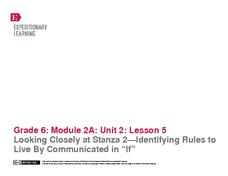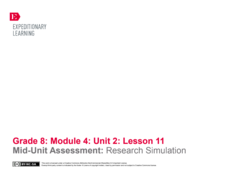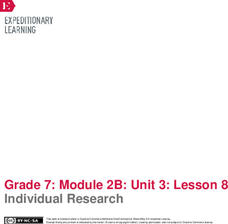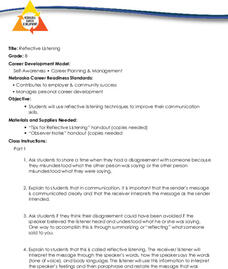EngageNY
Close Reading Excerpt 2: Plantation Life
Time for a good old fashioned match game! Readers complete an initial, second, and third read of Plantation Life to gain a deep understanding. After close reading the text, scholars practice identifying paraphrasing by matching sentences...
Curated OER
Basil Heatter, "The Long Night of the Little Boats"
“It was a miracle.” Basil Heatter’s “The Long Night of the Little Boats,” which details the miraculous rescue of the British army from the shores of Dunkirk in 1940, is featured in a series of exercises that ask class members to read,...
American Library Association
Explorers Project
Delve into the Age of Exploration with a multiple-intelligences research project. Learners generate a rubric and worksheet to guide their studies and research one explorer. There is emphasis on research skills, citing sources,...
EngageNY
End of Unit Assessment, Part 2: Research and Response
Talk it out. Scholars complete part two of the assessment by participating in a World Café discussion activity. Learners circulate the room, sharing their ideas and thoughts about Canada's natural resources using quotes and paraphrasing...
News Literacy Project
News Goggles: Quotes in News Reports
To quote or paraphrase? That is the question examined by a 29-slide presentation on the importance of including direct quotes in news reporting.
EngageNY
Mid-Unit 3 Assessment and Independent Reading Check
It's time for scholars to be on their own. Individuals work independently reviewing sources to answer their research questions. Learners read "Are Your Clothes Made in Sweatshops?" to help complete the mid-unit assessment. After...
EngageNY
Individual Research
Seventh graders get the option of choosing their own text from a selection to read and gather more information as part of their research. Learners discuss the difference in reading for research and reading for pleasure. They also begin...
EngageNY
Conducting Research: Asking and Answering our Questions about Rainforest Arthropods
Let's ask an expert. Scholars divide into groups to research and become experts on either ants or butterflies. Learners use task cards and text on their topic to complete a note catcher. At the end, they share their information with a...
K20 LEARN
To Ban or Not to Ban? Intellectual Rights and Responsibilities: Banned Books, Censorship Part 2
After examining different perspectives on book banning, scholars select a book from a list of frequently banned books and research the controversies surrounding it. They then craft an argument about their chosen book, including arguments...
Texas Education Agency (TEA)
How to Read and Analyze a Poem (English III Reading)
A poem is compressed speech, like a can of frozen juice with all the water pressed out. An interactive teaches users how to reconstitute the language, the structure, and the literary devices to appreciate all the subtleties the poet...
EngageNY
Looking Closely at Stanza 2—Identifying Rules to Live By Communicated in “If”
Pupils take part in a close reading of the poem, If by Rudyard Kipling, in which they delve deep into its meaning and identify its rules to live by. As the grand discussion progresses, learners then relate the poem's rules with those...
EngageNY
Grade 9 ELA Module 2, Unit 2, Lesson 16
Was Oedipus' destiny determined by fate or by his actions? Using details from the text, ninth graders delve into a critical thinking exercise based on Sophocles' Oedipus the King. Now that Oedipus has learned his true identity, readers...
Hampton-Brown
From "First Crossing"
Young scholars look closely at four tales taken from the collection of short stories, First Crossing edited by Donald R. Galloby. While examining the life of four teenagers and the lives they lead as U.S. immigrants, your enthusiastic...
Teach It Primary
The Pied Piper of Hamelin
Six tasks make up a lesson plan designed to reinforce comprehension and language skills using the poem "The Pied Piper" by Robert Browing. Scholars discuss and define unknown words, identify adjectives and onomatopoeia, review complex...
EngageNY
Further Research: Industrial Food Chain
Scholars extend their research of the food chain that Michael Pollan discusses in The Omnivore's Dilemma. They determine additional consequences of the food chain and add them to their Cascading Consequences charts. Additionally, pupils...
EngageNY
Mid-Unit Assessment: Research Simulation
As part of a mid-unit assessment, scholars complete a research simulation about food deserts to mimic the research process. Afterward, they engage in a think-pair-share to discuss what they've learned throughout the unit.
EngageNY
Deepening Your Research: The Effect of Advertising on Gender Roles
Let's get back on the road! Scholars continue using their research roadmaps to explore the role of gender while reading Cover Girl Culture. The teacher guides readers through the text as they underline specific sentences. Learners then...
EngageNY
Mid-Unit Assessment and Independent Reading Check-In
Your turn! Seventh graders work independently to complete the mid-unit assessment. They first read Images in Men in Advertising then answer questions referring to the text. When they finish the assessment, pupils read on their own.
EngageNY
Individual Research
Class members choose an ad they want to analyze for their performance task. They then read specific text based on the ad they chose. The instructor guides learners through a Model Research Synthesis document in which they try to...
EngageNY
Evaluating Sources, Continued: The ONLINE EDUCA Debate 2009 (Part 2 of 10)
Watching videos and playing online games can be educational, but too much screen time has its drawbacks. Pupils watch a video about the topic and write down the claim, reasons, and evidence in support of reduced screen time for children....
EngageNY
Using Effective Search Terms: Researching Screen Time
The proof is in the reading. Scholars read an article, "Attached to Technology and Paying the Price," and answer text-dependent questions. Next, they complete a Venn diagram to contrast two authors' use of evidence on the topic of screen...
EngageNY
Organizing Evidence and Writing an Opinion Paragraph: The Importance of Sports in American Society, Part II
Batter up! Using the resource, pupils continue reading an informational article about sports in America and identify evidence that supports the author's opinion. Scholars then write an opinion paragraph about sports.
EngageNY
Mid-Unit Assessment: On-Demand Note-Taking, Analysis, and Reflection: “Should We Drill?”
Pupils take a mid-unit assessment, completing a point of view graphic organizer based on an informational article about offshore drilling. Next, learners answer text-dependent and short-answer questions about the text.
Nebraska Department of Education
Reflective Listening
Reflective listening is not casual! After learning about the practice of reflective listening, middle schoolers practice reflective listening skills in a role play activity that has them take turns being a speaker, listener, and observer.
Other popular searches
- Summarizing and Paraphrasing
- Paraphrasing Activities
- Paraphrasing Middle School
- Paraphrasing Exercise
- Note Taking Paraphrasing
- Teaching Paraphrasing
- Paraphrasing Worksheets
- Poetry Paraphrasing
- Paraphrasing Lesson Ideas
- Paraphrasing Text and Charts
- Notetaking Paraphrasing
- Paraphrasing Sonnets

























